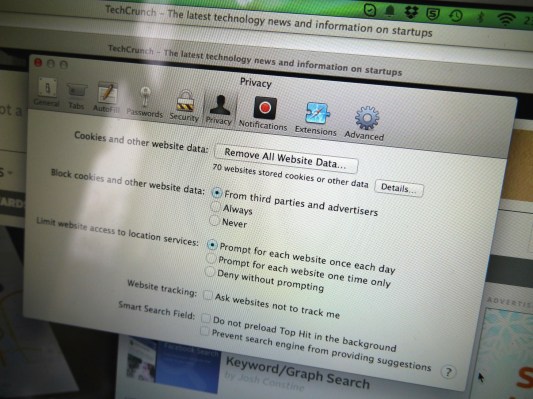File it under ‘chilling effects’: A new report by the Pew research centre suggests a sizable minority of people in the U.S. have changed their behavior and use of technology to try to avoid online government surveillance programs in the wake of disclosures triggered by NSA whistleblower Edward Snowden.
The report found that almost a third (30%) of Americans have taken steps to shield or hide their information from government digital dragnets — such as changing privacy settings or being more discreet in the things they say and search for. The poll is based on an online survey of 475 adults, of 18 years of age or older, conducted between November 26, 2014, and January 3, 2015.
As a whole, the poll shows the American public is largely split down the middle between concern and disinterest on the issue. A small majority (52%) said they were “very concerned” or “somewhat concerned” by government surveillance programs, but a sizable minority (46%) said they were “not very concerned” or “not at all concerned”.
Of those U.S. adults who have made technology changes in an attempt to be less visible to government snooping, the most common behavioral tweak has been to privacy settings on social media; closely followed by people avoiding certain apps entirely and using social media less often. Changing how they use email accounts was also an identified shift in the report.
Other changes include speaking to people in person more often rather than communicating online or over the phone; uninstalling certain apps, avoiding certain terms in online comms, and unfriending/unfollowing people on social media; and not using certain terms when using a search engine. Eight per cent of those who have made changes as a result of hearing about government snooping programs said they have even deleted some social media accounts entirely.
It’s the second such post-Snowden privacy-focused report published by Pew, after an earlier report last November which identified huge concern among web users about how their personal data is being harvested and processed by online companies.
In this latest report, Pew found that the vast majority (87%) of adults have heard at least something about government surveillance programs. And the third (31%) who have heard “a lot” express most concern about the dragnets — including being less confident the programs are in the public interest, and more likely to worry courts are not striking the right balance between privacy and law enforcement/security agency needs.
Overall, a small majority (57%) of respondents said it is “unacceptable“ for the government to monitor the communications of U.S. citizens. But the poll also found that a majority of Americans don’t have concerns about government spying directly elsewhere — including spying on the comms of U.S. leaders, or foreign leaders, or foreign citizens.
When it comes to safeguarding their own comms, the report identifies what it describes as “notable numbers” of citizens who have not yet adopted or considered adopting some of the most advanced privacy tools, such as do-not-track search engines, PGP encryption for email, proxy servers or TOR for browsing.
In most cases it identifies a clear lack of awareness around such tools, with around a third or more of respondents not being aware of the specific measures. The exception is search engines that don’t track user history. Only 13% said they did not know about these, but a majority (53%) still has not adopted or considered adopting them.
